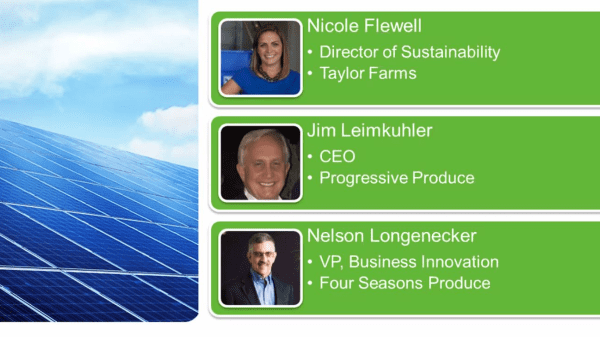
So many produce companies have invested in sustainable practices and found the business and environmental payoff, but the investment in telling consumers is usually too expensive.
For now, it’s good enough to tell your customers. But there are cost-effective ways to share it beyond that.
In a Feb. 18 webinar by Newark, DE-based Produce Marketing Association BB #:153708, three produce companies with significant sustainable infrastructure shared their tips with getting that message out to a society eager to hear that businesses are interested in more than simply profits.
“We think it’s important to tell our customers,” said Jim Leimkuhler, CEO of Progressive Produce BB #:113613 Los Angeles. “To tell consumers, that’s harder to do.”
Nicole Flewell, director of sustainability for Taylor Farms BB #:154001, Salinas, CA, said all the company’s customers are interested in hearing about its sustainability programs.
“We talk about it with every customer meeting,” she said. “It’s hard to get the word out to consumers, but we have monthly posts on social media” about sustainability.
Nelson Longenecker, vice president of business innovation for Four Seasons Produce BB #:103701, Ephrata, PA said customer response to their sustainable message has been strong, especially with groups promoting organic fresh produce.
“We’ve also had candidates attracted to us,” he said, based on their social messaging. “It’s has business value, and people want to work for a purpose-driven organization.”
Ed Treacy, vice president of supply chain and sustainability at PMA, said in a month or two, PMA plans to help its members by releasing a guidance document for companies to share their sustainability stories.
PMA also will soon have an online assessment tool for companies to see where their sustainable practices measure up to industry peers.
“We are a sustainable industry by definition,” Treacy said.
So many produce companies have invested in sustainable practices and found the business and environmental payoff, but the investment in telling consumers is usually too expensive.
For now, it’s good enough to tell your customers. But there are cost-effective ways to share it beyond that.
In a Feb. 18 webinar by Newark, DE-based Produce Marketing Association BB #:153708, three produce companies with significant sustainable infrastructure shared their tips with getting that message out to a society eager to hear that businesses are interested in more than simply profits.
“We think it’s important to tell our customers,” said Jim Leimkuhler, CEO of Progressive Produce BB #:113613 Los Angeles. “To tell consumers, that’s harder to do.”
Nicole Flewell, director of sustainability for Taylor Farms BB #:154001, Salinas, CA, said all the company’s customers are interested in hearing about its sustainability programs.
“We talk about it with every customer meeting,” she said. “It’s hard to get the word out to consumers, but we have monthly posts on social media” about sustainability.
Nelson Longenecker, vice president of business innovation for Four Seasons Produce BB #:103701, Ephrata, PA said customer response to their sustainable message has been strong, especially with groups promoting organic fresh produce.
“We’ve also had candidates attracted to us,” he said, based on their social messaging. “It’s has business value, and people want to work for a purpose-driven organization.”
Ed Treacy, vice president of supply chain and sustainability at PMA, said in a month or two, PMA plans to help its members by releasing a guidance document for companies to share their sustainability stories.
PMA also will soon have an online assessment tool for companies to see where their sustainable practices measure up to industry peers.
“We are a sustainable industry by definition,” Treacy said.
Greg Johnson is Director of Media Development for Blue Book Services



